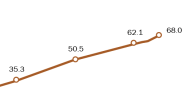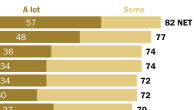About four-in-ten Hispanic women say that being female or Hispanic impacts their daily lives. In fact, Hispanic women are more likely than Hispanic men to say sexism is a problem in the workplace, schools and the media.
Differences by gender disappear in other areas. Similar shares of Hispanic women and Hispanic men say they have been treated as if they’re not smart.
This chapter explores Latinas’ views of sexism and their experiences with harassment and discrimination.
The impact of gender, Hispanic identity and skin color on the lives of Latinas
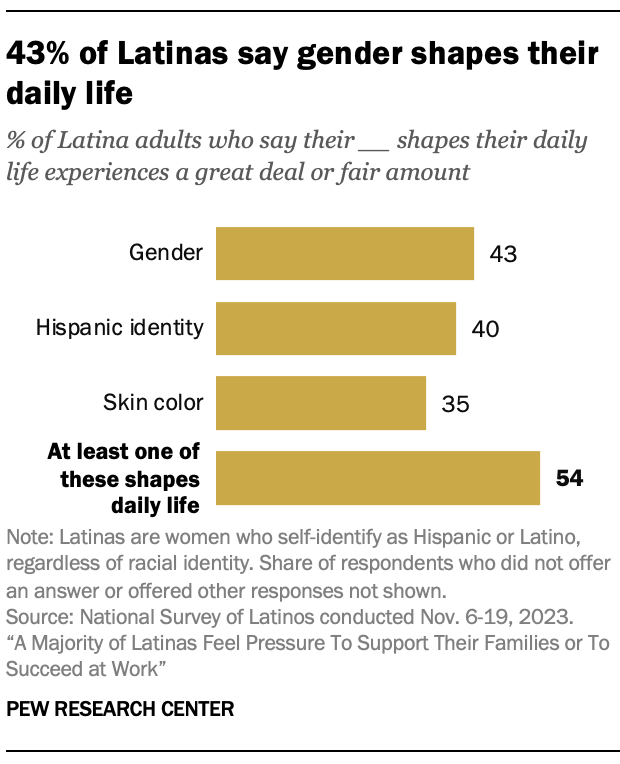
Substantial shares of Hispanic women say gender (43%), Hispanic identity (40%) and skin color (35%) shape their daily life experiences a great deal or a fair amount. Overall, 54% say at least one of these shapes their daily life.
By comparison, Hispanic men are somewhat less likely than Hispanic women to say gender (38%), Hispanic identity (36%) and skin color (30%) impact their daily lives a great deal or a fair amount.
Does gender shape daily life for Latinas?
Latinas’ opinions on how much gender shapes their lives can vary by age, education, nativity and political party:
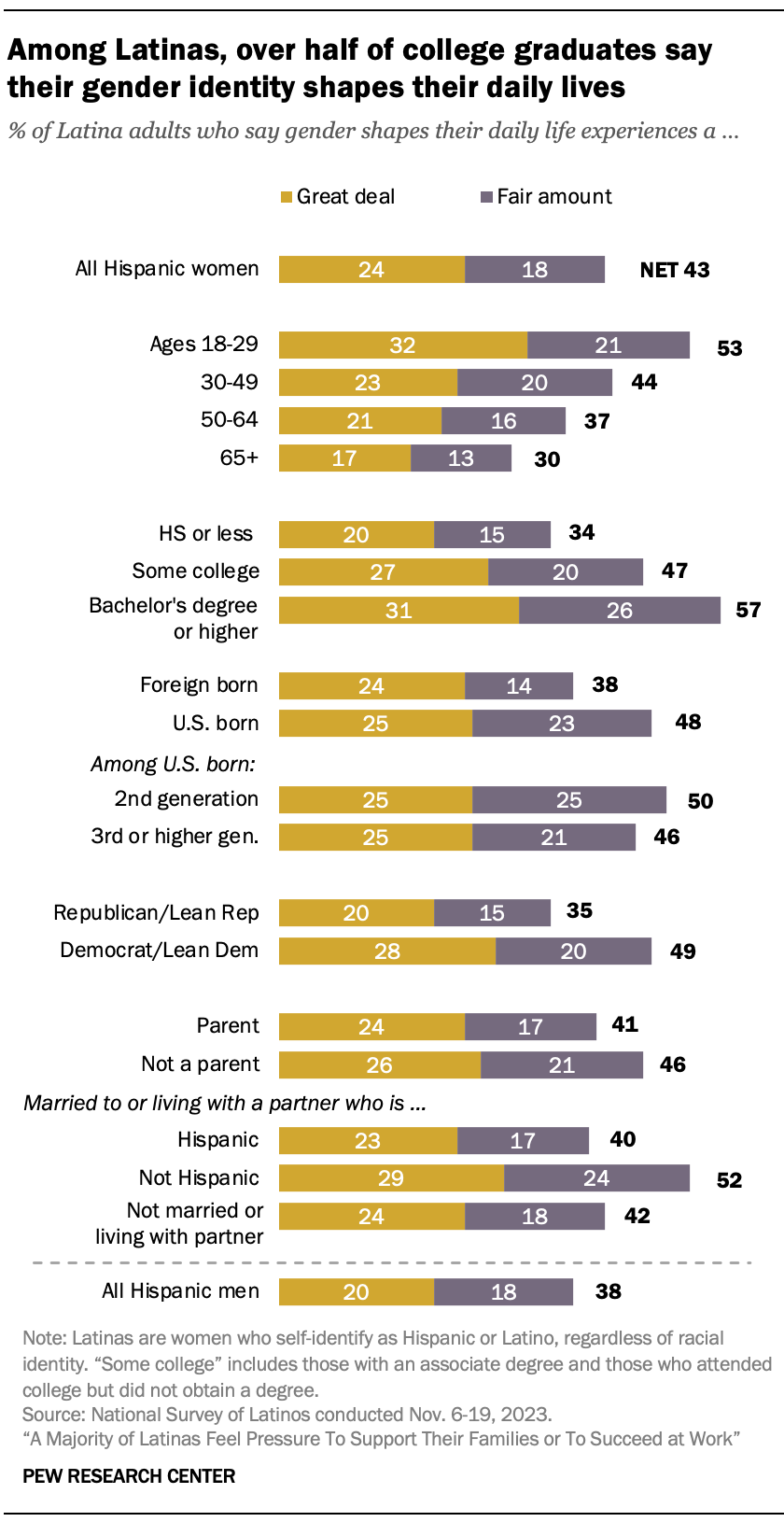
- Age: About half (53%) of Latinas ages 18 to 29 say gender shapes their life, while 30% of Latinas 65 and older say so.
- Education: A majority of Latinas (57%) with a bachelor’s degree or higher say gender shapes their daily life experiences. By comparison, 34% of Latinas with a high school diploma or less say the same.
- Party identification: About half of Latinas (49%) who identify as Democrats or lean toward the Democratic Party say gender shapes their daily life, compared with 35% of Latinas who identify as Republicans or lean Republican.
- Nativity: Nearly half (48%) of Latinas born in the United States say gender shapes their daily life, compared with 38% of Latina immigrants.
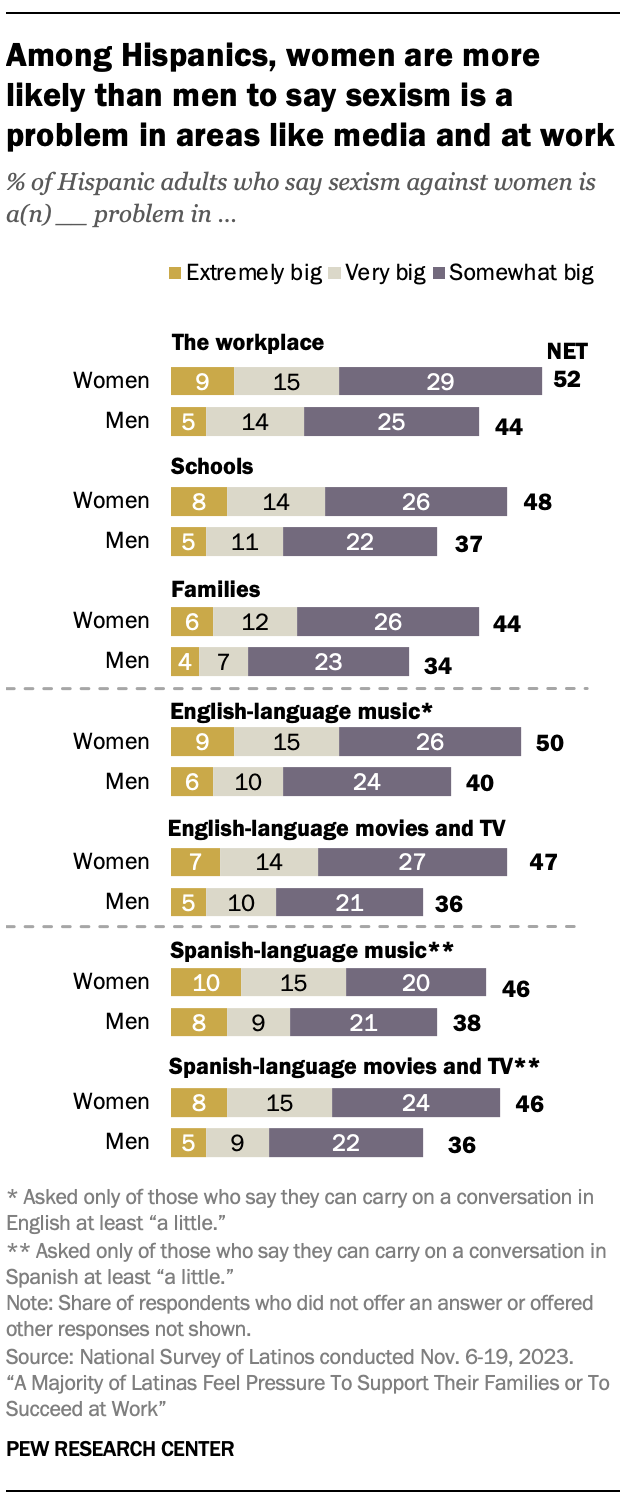
How do views of sexism differ by gender?
Hispanic women are more likely than Hispanic men to say sexism against women is at least a somewhat big problem in media, the workplace, schools and families.
- 52% of Hispanic women say sexism against women in the workplace is at least a somewhat big problem, compared with 44% of Hispanic men.
- 48% of Hispanic women say sexism against women in schools is at least a somewhat big problem, while 37% of Hispanic men say this.
- Half of Hispanic women say sexism against women in English-language music is a problem, versus 40% of Hispanic men.4
- 46% of Hispanic women say sexism against women in Spanish-language music is a problem, compared with 38% of Hispanic men.5
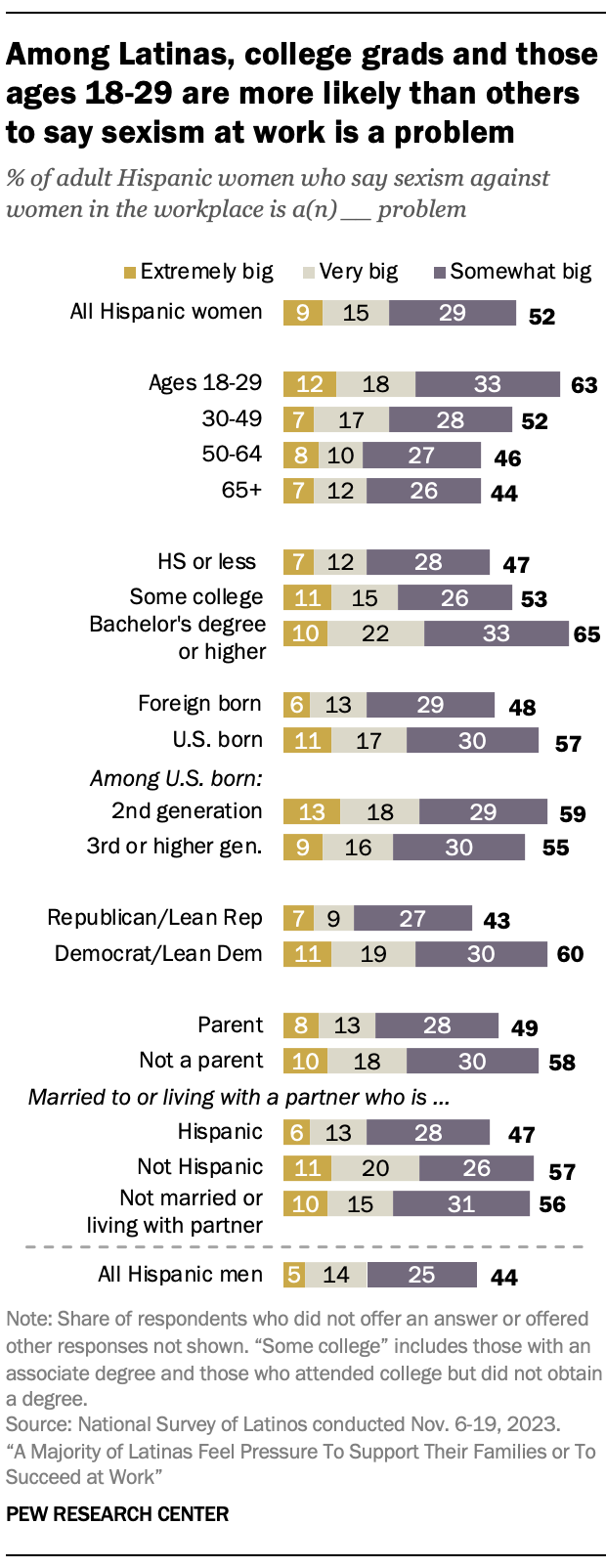
How do different groups of Latinas view sexism in the workplace?
Latinas who are young adults, college graduates, U.S. born, Democrats or don’t have children are more likely to say that sexism against women at work is at least a somewhat big problem:
- Age: 63% of Latinas ages 18 to 29 say sexism in the workplace is at least a somewhat big problem, compared with 44% of those 65 and older.
- Education: 65% of Latinas who are college graduates say sexism in the workplace is at least a somewhat big problem, versus 47% of those with a high school diploma or less.
- Immigrant generation: 59% of Latinas who are U.S. born and have at least one immigrant parent (second-generation Hispanics) say this is at least a somewhat big problem, compared with 48% of Latina immigrants.
- Party affiliation: 60% of Latinas who identify as or lean Democratic say workplace sexism is at least a somewhat big problem, compared with 43% of Republican and Republican-leaning Latinas.
What experiences do Latinas have with harassment and discrimination?
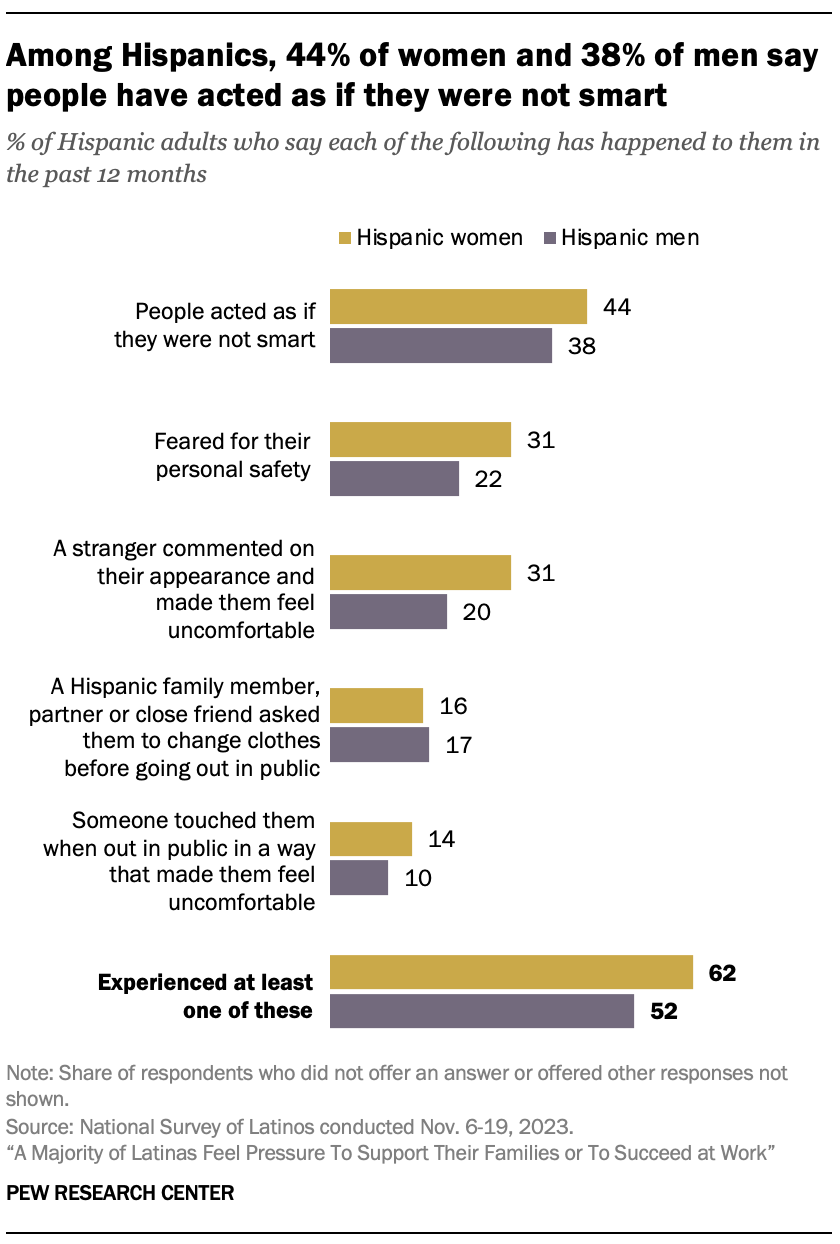
Over four-in-ten Hispanic women (44%) say that in the past 12 months people have acted as if they were not smart, the most common of five negative experiences asked about in our survey. Meanwhile, 38% of Hispanic men say they experienced the same thing.
About a third (31%) of Hispanic women say they have feared for their personal safety in the past year. The same share say a stranger made a comment about their appearance that made them feel uncomfortable during this time. By contrast, Hispanic men are less likely to say these experiences have happened to them.
Overall, a majority of Hispanic women (62%) and about half of Hispanic men (52%) say at least one of these five negative experiences has happened to them in the past year.
By immigrant generation and age
Among Hispanic women, those who are second generation (71%) are more likely than immigrants (59%) to say they have had at least one of the five negative experiences happen to them.
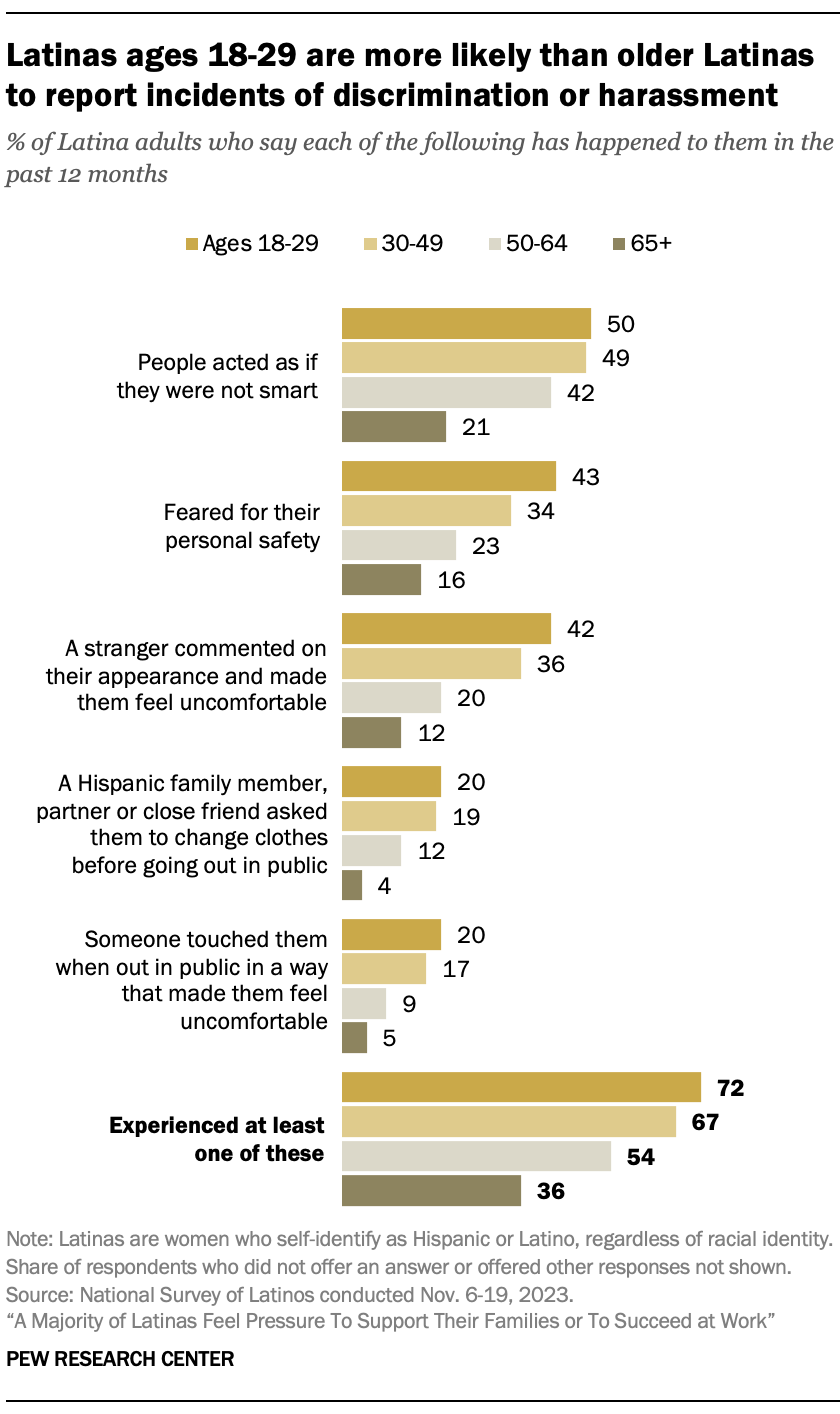
Notable differences exist between the youngest and oldest age groups of Latinas:
- 50% of Latinas ages 18 to 29 say people have acted as if they were not smart in the past year, compared with 21% of those 65 and older.
- 43% of Latina adults under 30 say they have feared for their personal safety in the past year, versus 16% of those 65 and older.
- 42% of Latinas 18 to 29 say a stranger commented on their appearance and made them feel uncomfortable, compared with 12% of those in the oldest age group.
Overall, 72% of Latinas ages 18 to 29 say they havehad at least one of the survey’s five negative experiences happen to them in the past year, compared with 36% of those 65 and older.

